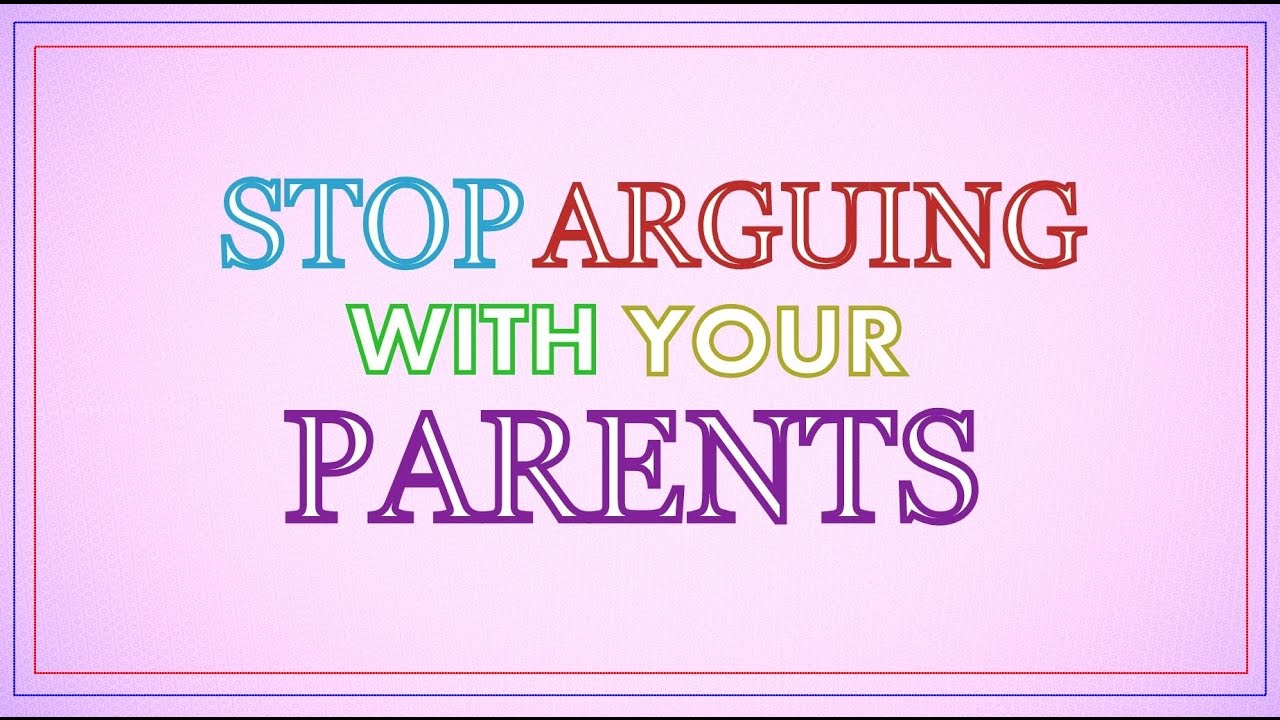
How Do You Get Your Parents To Stop Fighting: A Comprehensive Guide
Witnessing parental conflict can be deeply distressing, regardless of age. The constant tension, raised voices, and emotional outbursts can create a stressful and unsettling home environment. If you are asking, “How do you get your parents to stop fighting?”, know that you’re not alone. Many children and young adults find themselves in similar situations, feeling helpless and anxious. While you can’t directly control your parents’ behavior, there are steps you can take to manage the situation and potentially reduce the frequency and intensity of their arguments. This guide aims to provide practical advice and strategies for navigating this challenging situation.
Understanding Parental Conflict
Before attempting to intervene, it’s crucial to understand the potential reasons behind your parents’ disagreements. Marital conflict is often complex and multifaceted, stemming from various sources. Common causes include:
- Financial Stress: Money is a frequent source of conflict in many relationships. Disagreements about spending habits, debt, and financial priorities can lead to heated arguments.
- Communication Issues: Poor communication skills are a major contributor to conflict. When couples struggle to express their needs and concerns effectively, misunderstandings and resentment can build.
- Differing Parenting Styles: Disagreements about child-rearing practices, discipline, and values can create tension between parents.
- Household Responsibilities: An unequal distribution of household chores and responsibilities can lead to resentment and conflict, especially if one partner feels overburdened.
- External Stressors: Job loss, health problems, or family issues can put a strain on a relationship and increase the likelihood of arguments.
- Lack of Intimacy: Emotional or physical distance between partners can contribute to feelings of dissatisfaction and conflict.
- Unresolved Past Issues: Lingering resentments and unresolved conflicts from the past can resurface and fuel current arguments.
Recognizing the underlying causes of your parents’ fighting can help you understand the dynamics at play and develop more effective strategies for managing the situation. It’s also important to remember that their conflict is rarely about you, even if it feels that way sometimes.
Strategies for Managing Parental Conflict
While you can’t force your parents to stop fighting, you can take steps to mitigate the impact of their conflict on your own well-being and potentially influence their behavior. Here are some strategies to consider when thinking about “how do you get your parents to stop fighting“:
Create Distance
One of the most effective ways to protect yourself from the negative effects of parental conflict is to create physical and emotional distance. This might involve:
- Leaving the Room: If your parents start arguing, politely excuse yourself and go to another room.
- Using Headphones: Listening to music or a podcast can help block out the noise and create a sense of calm.
- Spending Time Elsewhere: If possible, spend time at a friend’s house, the library, or engaging in activities outside the home.
- Limiting Exposure: Reduce the amount of time you spend around your parents when they are likely to argue.
Creating distance allows you to detach from the situation and protect your emotional well-being. It also prevents you from getting caught in the middle of their arguments.
Communicate Your Feelings
Expressing your feelings to your parents is crucial, but it’s important to do so in a calm and respectful manner. Choose a time when they are both relatively calm and receptive. Use “I” statements to express how their fighting affects you. For example:
“I feel anxious and stressed when you argue. It makes it difficult for me to concentrate on my schoolwork and enjoy being at home.”
Avoid blaming or accusing them, as this will likely escalate the situation. Focus on expressing your own emotions and needs. Be specific about the behaviors that bother you and suggest alternative ways they could handle their disagreements. When thinking about “how do you get your parents to stop fighting“, direct and calm communication can be effective.
Set Boundaries
Setting boundaries is essential for protecting your emotional and mental health. This involves clearly communicating what you are and are not willing to tolerate. For example:
- Refuse to Take Sides: Let your parents know that you will not take sides in their arguments.
- Don’t Engage in Their Conflict: Avoid getting drawn into their arguments or acting as a mediator.
- Limit Exposure to Arguments: Tell them that you need to leave the room when they start fighting.
- Protect Your Space: Insist that they respect your privacy and avoid arguing in your bedroom or personal space.
Enforcing boundaries can be challenging, but it’s crucial for maintaining your own well-being. Be firm and consistent in your communication.
Encourage Professional Help
If your parents’ fighting is frequent, intense, or affecting their ability to function, it may be necessary to encourage them to seek professional help. Therapy can provide them with the tools and strategies they need to communicate more effectively, resolve conflicts constructively, and improve their relationship. Bringing up the idea of therapy can be sensitive, so approach the topic with empathy and understanding. You could say something like:
“I’m concerned about your relationship and how much you’ve been fighting. I think therapy could be a helpful way for you to work through your issues and improve your communication.”
Offer to research therapists or counselors in your area and provide them with information. If they are hesitant, emphasize the potential benefits of therapy, such as reducing stress, improving communication, and strengthening their relationship. When considering “how do you get your parents to stop fighting“, this is a proactive and potentially long-term solution.
Focus on Self-Care
Dealing with parental conflict can be emotionally draining, so it’s essential to prioritize self-care. This involves taking steps to protect your physical and mental health. Some self-care strategies include:
- Getting Enough Sleep: Aim for 7-8 hours of sleep per night.
- Eating a Healthy Diet: Nourish your body with nutritious foods.
- Exercising Regularly: Physical activity can help reduce stress and improve mood.
- Practicing Relaxation Techniques: Try meditation, deep breathing, or yoga.
- Engaging in Hobbies: Spend time doing activities you enjoy.
- Connecting with Friends: Social support can provide comfort and perspective.
Taking care of yourself will help you cope with the stress of your parents’ fighting and maintain your overall well-being. Remember, you can’t pour from an empty cup. Prioritize your needs and make time for activities that bring you joy and relaxation. Addressing “how do you get your parents to stop fighting” starts with ensuring your own well-being.
Seek Support
Don’t hesitate to seek support from trusted adults, such as family members, friends, teachers, or counselors. Talking about your feelings can help you process your emotions and gain perspective. A therapist or counselor can provide you with coping strategies and support as you navigate this challenging situation. They can also help you develop healthy communication skills and boundaries. Remember, you are not alone, and seeking help is a sign of strength, not weakness.
When to Seek External Intervention
In some cases, parental conflict can escalate to the point where it poses a threat to the safety and well-being of the children involved. If you are witnessing abuse, neglect, or violence, it’s crucial to seek external intervention. This might involve contacting:
- Child Protective Services: If you suspect child abuse or neglect.
- Law Enforcement: If there is domestic violence or threats of violence.
- A Trusted Adult: A family member, teacher, or counselor who can help you navigate the situation and connect you with resources.
Your safety and well-being are paramount. Don’t hesitate to seek help if you feel threatened or unsafe. Knowing “how do you get your parents to stop fighting” is less important than ensuring your own safety in extreme situations.
Long-Term Strategies
While the immediate strategies above can help you cope with your parents’ fighting, it’s also important to consider long-term solutions. This might involve:
- Family Therapy: Family therapy can help your entire family learn to communicate more effectively and resolve conflicts constructively.
- Individual Therapy: Individual therapy can help you process your emotions and develop coping strategies for dealing with parental conflict.
- Improving Communication Skills: Learning effective communication skills can help you express your needs and concerns in a clear and respectful manner.
- Setting Realistic Expectations: Accept that you cannot control your parents’ behavior and focus on what you can control, such as your own reactions and boundaries.
Addressing the underlying issues that contribute to your parents’ fighting can lead to a more peaceful and harmonious home environment. Remember that change takes time and effort, so be patient and persistent in your efforts. When thinking about “how do you get your parents to stop fighting“, remember that long-term solutions often require professional assistance and commitment from all parties involved.
The Importance of Self-Compassion
It’s important to practice self-compassion when dealing with parental conflict. Be kind and understanding towards yourself, and acknowledge that you are doing the best you can in a difficult situation. Avoid blaming yourself for your parents’ problems or feeling responsible for fixing their relationship. Remember that you are not alone, and many children and young adults experience similar challenges. Focus on taking care of yourself and seeking support when you need it. Understanding “how do you get your parents to stop fighting” is not about taking on responsibility for their actions, but about protecting yourself and promoting your own well-being.
Conclusion
Dealing with parental conflict is a challenging and emotionally draining experience. While you cannot directly control your parents’ behavior, you can take steps to manage the situation and protect your own well-being. By creating distance, communicating your feelings, setting boundaries, encouraging professional help, focusing on self-care, and seeking support, you can navigate this difficult situation with greater resilience and strength. Remember that you are not alone, and seeking help is a sign of strength. While you’re figuring out “how do you get your parents to stop fighting“, prioritize your own emotional and mental health. If you are witnessing abuse, neglect, or violence, it’s crucial to seek external intervention to ensure your safety and well-being. [See also: Coping with Stressful Family Situations] [See also: How to Improve Communication in Your Family] [See also: The Importance of Family Therapy]

